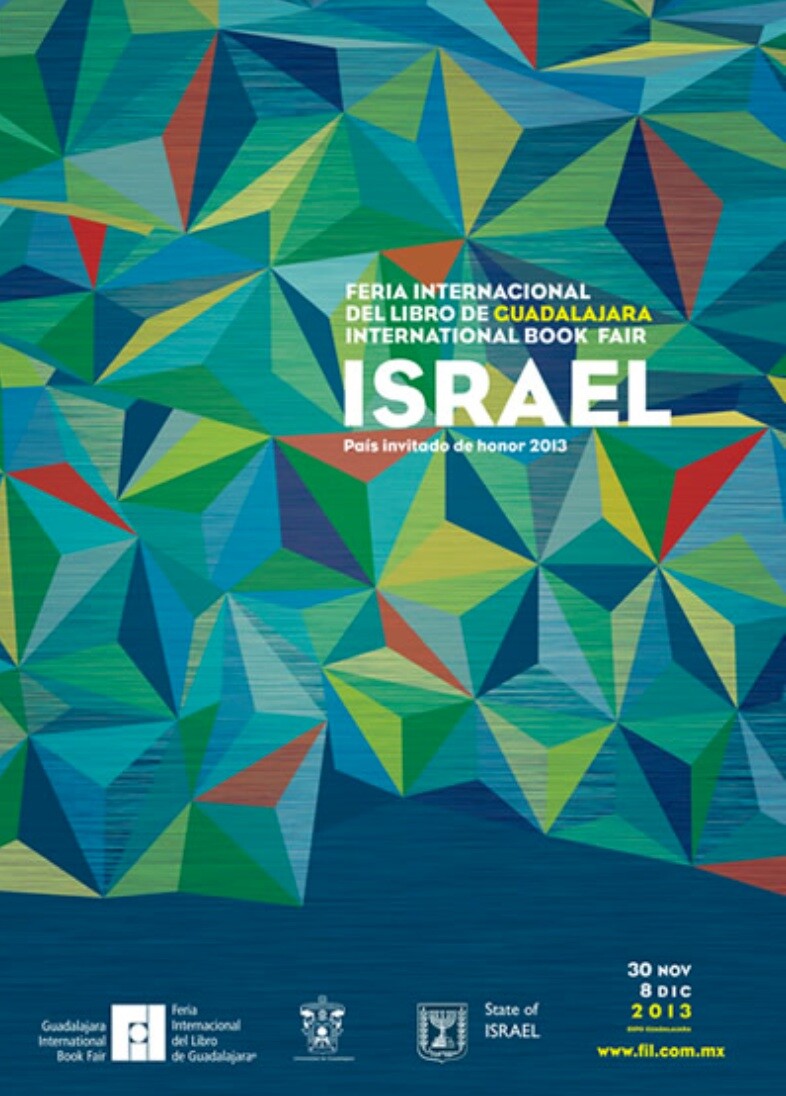Arts and Culture 6 November 2013

Guadalajara International Book Fair promotion of Israel as its 2013 “Guest of Honor.”
Israel’s invitation to be “guest of honor” at the Guadalajara International Book Fair later this month has provoked controversy in Mexico.
A group of writers and intellectuals have objected to the one-sided inclusion of Israel and demanded recognition for Palestine.
Calling Israel a “Jewish fundamentalist state in the garb of a Western democracy,” they are urging festival organizers to create a more pluralistic program.
Now in its 27th year, the annual Guadalajara International Book Fair is among the most important cultural events in Latin America, notes the Arabic literature and culture website Qadita.
“There is a fundamental point that cannot be ignored: the State of Israel has an ethnic and sectarian character. It is not a state of its citizens, but a state exclusively for part of its citizens, the Jews,” the intellectuals say.
The signatories include Argentine poet and Cervantes Prize winner Juan Gelman, the Mexican poet, diplomat and academic Hugo Gutierrez Vega and Mexican poet Aline Pettersson.
Pilar Calveiro, the Argentine academic and expert on her country’s history of political violence, is also among the endorsers.
Israel “guest of honor”
“With Israel as guest of honor,” this year’s fair, which runs from 30 November to 8 December, “will welcome three Nobel prize laureates – Ada Yonath, [Israeli President] Shimon Peres and Mario Vargas Llosa,” the festival’s website states.
“The convergence of modernity with tradition and scientific development will be the pillars [of] Israel’s participation,” it adds.
As “guest of honor,” Israel “will arrive with a delegation formed by their best authors, academics and artists” and the program “will showcase the innovation, richness and vitality of the Israeli culture,” the fair organizers state.
The fair will also include an exhibition of “facsimiles of the Dead Sea Scrolls,” priceless artifacts of Palestine’s heritage illegally pillaged by Israel from the occupied territories after 1967.
The invitation is a public relations coup for Israel which is consistently ranked as one of the most negatively viewed countries in the world.
Its propaganda efforts often aim to present it as a country of literature, art and science to conceal the reality of land theft, colonization and apartheid rule over millions of Palestinians.
Call for inclusion
But as Mexico’s La Jornada newspaper reported on 28 October, dozens of leading cultural figures have condemned Israel’s discriminatory character and called for a more balanced program.
Here’s a translation:
A group of academics, intellectuals, writers, former ambassadors and professors, have warned that the presence of Israel as a guest at the Guadalajara International Book Fair – cannot be separated from the tragedy that [Israel] represents for Palestine.
Margit Frenk, Juan Gelman, Hugo Gutierrez Vega, Eduardo Mosches, Héctor Díaz Polanco, Aline Pettersson, Luis Tovar, Pedro Miguel, among others, say that the creation of the State of Israel, begun in 1948, through United Nations Resolution 181, which partitioned Palestine – then under the British Mandate – into two states: one Jewish, the other Arab.
Nevertheless, the policy of Zionism, as a Eurocentric national movement, meant that, from the moment it was installed on Palestinian territory, the new state of Israel opted for confrontation with the local majority population, and not for a policy of coexistence with the native people.
“There is a fundamental point that cannot be ignored: the State of Israel has an ethnic and sectarian character. It is not a state of its citizens, but a state exclusively for part of its citizens, the Jews. In this sense it can be seen as a Jewish fundamentalist state in the garb of a Western democracy,” they state.
Peaceful coexistence depends on an inescapable moral and political decision: to abandon the colonial and expansionist conception of Zionist ideology. Such a decision would have to lead to the withdrawal of the army from the Palestinian territories, and to make half a million Jewish colonists in the West Bank abandon this territory (or if they want to stay there, to accept to live under a Palestinian government), and to stop immediately the construction of thousands of homes for Jewish settlers in the occupied Palestinian territories.
Given this reality, we consider it indispensable that Mexico recognize the existence of the two states, and we request that roundtables on the topic of Israel-Palestine be convened so that people can express different viewpoints. This would help to provide more pluralistic knowledge of the invited country. And from the same pluralistic perspective, we ask that the next country invited to the International Book Fair be Palestine, with the presence of writers, filmmakers, musicians and painters.
Completing the list of signers are Francesca Gargallo, Pedro Miguel, Marcos Límenes, Nestor Braunstein, Silvana Rabinovich, Octavio Rodríguez Araujo, Pilar Calveiro, Mauricio Schoijet, Horacio Cerutti, Saúl Ibargoyen, Teresa Guitián, Claudio Albertani, Jessica Beckerman.
Poetry can’t cover it up
The call has not met with universal support. The Mexican historian Humberto Musacchio, an habitual pro-Israel columnist, wrote in a 4 November article in Excélsior that it is “legitimate” to ask that Palestine be included, however at a later date.
Otherwise, he feared, “Israel, quite rightly, would withdraw if they change the program at the last minute without consulting it.”
But Musacchio objected strongly to characterizations of Israel as having a “sectarian” character and engaging in “ethnic cleansing.”
Claiming that such statements are “untenable,” he charged that “it does not contribute to understanding among people – nor even strengthen the Palestinian cause” to express “exclusivist attitudes or to make statements that do not fit with history or truth, or which demonize one of the parties.”
Musacchio, it seems, can only defend Israel by denying what more and more people around the world can see clearly: Palestinians are subject to a brutal colonial reality.
No amount of poetry and literature can cover that up.




